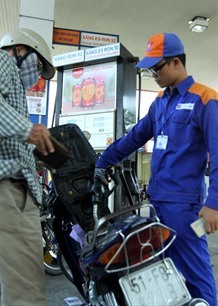 Economy
Economy

 |
| A customer buys petrol at a station in HCM City. - VNA/VNS Photo Thanh Vũ |
HÀ NỘI — The prices of RON 92 petrol and biofuel E5 fell by VNĐ124 and VNĐ97 per litre, respectively, as of 4:55 pm on Friday.
Following a joint decision by the Ministry of Industry and Trade and the Ministry of Finance, the prices of diesel 0.05S and kerosene also dropped by VNĐ434 and VNĐ104 per litre respectively.
Under the decision, the maximum price of RON 92 and E5 fuels will be VNĐ17,875 (US$0.78) and VNĐ17,634 per litre, while the ceiling prices for diesel 0.005S and kerosene are VNĐ14,410 and VNĐ12,999 per litre.
This is the 20th adjustment of fuel prices this year. They have fallen nine times, increased seven times and remained unchanged twice.
The Ministry of Industry and Trade said in a statement published on the portal moit.gov.vn that the global average prices of RON 92 over the last 15 days until October 20 was $66.983 per barrel, while that of diesel 0.05S was $68.142 per barrel.
The ministries also decided to use the price stabilisation fund for RON 92 at VNĐ130 per litre, and for E5 biofuel remained at VNĐ110 per litre. The price stabilisation fund is used to stabilise petrol prices and avoid possible negative impacts on socio-economic development. The fund compensates importers for losses they incur because of low selling prices.
Việt Nam’s largest petrol retailer, Petrolimex, had recorded VNĐ3.19 trillion in its petrol price stabilisation fund as of yesterday, an increase of VNĐ49 billion compared to the previous price adjustment on October 5.
Violators punished, shamed
To prevent illegal petrol dealing and protect the rights of consumers, the Ministry of Industry and Trade has asked local authorities to publicise the names of violating petrol stations on mass media.
The ministry has also asked local authorities to raise awareness among consumers and organisations so that they avoid buying petrol and petrol products from illegal businesses. Local departments of industry and trade have been told to increase inspections and closely monitor the market to prevent illegal trading of petrol products.
Local market watchdogs have also been told to enhance supervision and monitoring of petrol companies in their areas, identify those committing violations, and work with relevant government agencies to inspect the quality of petrol and petrol products being sold in the market. — VNS




